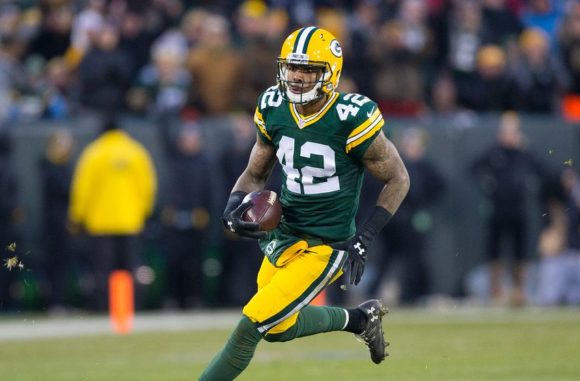When the Green Bay Packers inked Davante Adams to a much-deserved four-year contract extension, they did more than just ensure that the team’s top receiver was staying put. They made their offseason decision making, at least regarding their own free agents, significantly easier.
Adams was widely viewed as the team’s most important impending free agent, and now the Packers won’t have to deal with other teams competing for his service. That leaves a total of eight unrestricted free agents for Green Bay to address in the coming months. But unlike last season–when the Packers had to make tough calls on many key players–there are few big in-house free agent decisions looming ahead of the 2018 season.
The most important Packer set to test the market is unquestionably Morgan Burnett. The eight-year veteran has played exceptionally well throughout his career, providing an otherwise underwhelming unit with some much needed consistency.
His biggest issue has been staying healthy (Burnett hasn’t appeared in all 16 games since 2012), but his leadership and versatility would gel instantly with new defensive coordinator Mike Pettine’s schemes. Despite his injury history and the development of young talent like Josh Jones, retaining Burnett would go a long way toward easing the transition to a new defensive system in 2018.
After Burnett, the Packers don’t have many pieces that will command large amounts of attention on the open market. That bodes well for Green Bay, as they’ll either be able to retain players on cheap contracts or simply move on without the team’s depth suffering too much.
Besides Burnett, only Jeff Janis and Richard Rodgers will test free agency coming off deals longer than one year. In both cases, neither will be a hot commodity on the open market. Janis has been a good gunner on special teams, but never hit his stride as a returner and completely failed to become a weapon on offense. If he’s brought back, it would be solely for his contributions in punt coverage.
Meanwhile, Rodgers likely doesn’t fit into the Packers’ plans at tight end, a position they will try (again) to upgrade in 2018. Rodgers was a reliable receiver, and turned in a team-high eight receiving touchdowns in 2015, but was never the dynamic weapon Green Bay has been trying to find at the position.
Five of the team’s remaining UFAs–Ahmad Brooks, Davon House, Jahri Evans, Brett Goode, and Quinton Dial–are all at the end of one-year deals they signed before (or during, in Goode’s case) the 2017 season.
Brooks was brought in as a role player, but managed just 1.5 sacks as a Packer. Green Bay desperately needs to improve its pass rush, but Brooks, who will be 34 when the 2018 season starts, is not likely to be the answer moving forward. Also on the defensive line, Dial had very few opportunities and was largely a non-factor last season. The front office won’t lose any sleep if someone else signs him.
House underwhelmed in his return to Green Bay, struggling in coverage and managing just a single interception in 2017. Damarious Randall had a solid year, and Kevin King showed promise as a rookie, so if the Packers choose not to bring House back, the team won’t suffer too much. He could likely be kept at a low price to provide depth, but if House is starting again in 2018 then the Packers didn’t do enough to improve their secondary in the offseason.
In his first year with the Packers, Evans turned in a solid campaign. He played in 14 games, and while he is no longer a top-tier guard, he was a decent replacement for T.J. Lang. Green Bay may also have to address the oft-injured Bryan Bulaga before next season, so it’s possible they try to retain Evans on another one-year deal to allow for a little more stability on the offensive line.
Meanwhile, it is not out of the question to think that long snapper Brett Goode is the most important free agent not named Morgan Burnett. The often overlooked position is a vital part of special teams, and Goode remains better than players like Derek Hart and Taybor Pepper who filled in for Goode when he was injured. Green Bay hasn’t had any problem retaining Goode on short, inexpensive deals in recent years, and will likely try to do the same again in 2018.
Overall, the Packers do not have the same tough offseason decisions they have faced in recent seasons, at least as they pertain to their own free agents. That should allow new GM Brian Gutekunst to look at other team’s players and the draft to fill the roster with talent to make another Super Bowl push.
——————Sean Blashe is a Packers fan who grew up in Bears territory and is currently a journalism and history major at Marquette University. Sean is a writer with PackersTalk.com and you can follow him on twitter at @SeanBlashe .
——————


2 responses to “Packers Face Few Tough Decisions on Homegrown Free Agents”
Not only predictable but down right bad. MM cost them to many games with bad decisions
Bob W I agree with you. MM is a no change, predictable, no scheme offense. Look at Hundley, failure. Look at play calling. Failure. Look at receiver routes, 7 yards and out. Same ole, failure. No slants, rubs, end arounds, down the middle. Failure. What will change with MM. Very little. Depends on Rodgers making great plays, but as far as MM giving defenses different looks, NOT. Our offense is predictable before most snaps. Watch the film!!